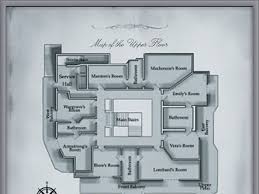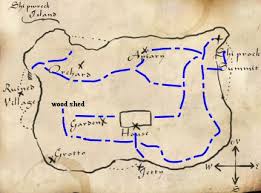On 5 November we read the rather moving Journey's End, which gives the reader/audience a taste of the horrors of the trenches in WW1. It was rather a long play, but one which would have been impossible to cut because no scene is 'wasted': each dialogue gives so much information about the characters in the piece, their lives, their fears and their hopes.
Next month will be much jollier! And not just because I'll have some wine mulling for the 'interval'!
We will read And Then There Were None by Agatha Christie: it is reputed to be one of her finest works, but although she thought it finely crafted Christie herself did not think so.
It is Christie's best-selling novel with 100 million sales to date, making it the world's best-selling mystery ever, and one of the best selling books of all time.
The play opened in 1943 under the title of the book: Ten Little Niggers, but when it opened in New York the following year the title was changed to Ten Little Indians. The original title was a reference to a song on which the piece was based:
This isn't going to spoil the story for you, because although the song is referred to in the play, the text was later adapted to reflect the song more accurately for film - but this isn't how the play we will be reading ends!
The play was adapted into a film in 1945, 1963 and again in 1974



There is a new adaptation to be screened by the BBC next year: I hope this won't spoil it for you!
I would urge you NOT to go to wikiepedia, and to try to stop you from doing so, here's a summary of the characters. Each has been summoned to an island from which they cannot escape (no boat, and the boatman has been paid not to answer distress signals), each is a murderer .. and then they mysteriously begin to die, one by one ...



Next month will be much jollier! And not just because I'll have some wine mulling for the 'interval'!
We will read And Then There Were None by Agatha Christie: it is reputed to be one of her finest works, but although she thought it finely crafted Christie herself did not think so.
It is Christie's best-selling novel with 100 million sales to date, making it the world's best-selling mystery ever, and one of the best selling books of all time.
The play opened in 1943 under the title of the book: Ten Little Niggers, but when it opened in New York the following year the title was changed to Ten Little Indians. The original title was a reference to a song on which the piece was based:
Ten little nigger boys went out to dine;
One choked his little self and then there were Nine.
Nine little nigger boys sat up very late;
One overslept himself and then there were Eight.
Eight little nigger boys travelling in Devon;
One said he’d stay there and then there were Seven.
Seven little nigger boys chopping up sticks;
One chopped himself in halves and then there were Six.
Six little nigger boys playing with a hive;
A bumble bee stung one and then there were Five.
Five little nigger boys going in for law;
One got into Chancery and then there were Four.
Four little nigger boys going out to sea;
A red herring swallowed one and then there were Three.
Three little nigger boys walking in the Zoo;
A big bear hugged one and then there were Two.
Two little nigger boys sitting in the sun;
One got frizzled up and then there was One.
One little nigger boy left all alone;
He went out and hanged himself and then there were None.
One choked his little self and then there were Nine.
Nine little nigger boys sat up very late;
One overslept himself and then there were Eight.
Eight little nigger boys travelling in Devon;
One said he’d stay there and then there were Seven.
Seven little nigger boys chopping up sticks;
One chopped himself in halves and then there were Six.
Six little nigger boys playing with a hive;
A bumble bee stung one and then there were Five.
Five little nigger boys going in for law;
One got into Chancery and then there were Four.
Four little nigger boys going out to sea;
A red herring swallowed one and then there were Three.
Three little nigger boys walking in the Zoo;
A big bear hugged one and then there were Two.
Two little nigger boys sitting in the sun;
One got frizzled up and then there was One.
One little nigger boy left all alone;
He went out and hanged himself and then there were None.
This isn't going to spoil the story for you, because although the song is referred to in the play, the text was later adapted to reflect the song more accurately for film - but this isn't how the play we will be reading ends!
The play was adapted into a film in 1945, 1963 and again in 1974
There is a new adaptation to be screened by the BBC next year: I hope this won't spoil it for you!
I would urge you NOT to go to wikiepedia, and to try to stop you from doing so, here's a summary of the characters. Each has been summoned to an island from which they cannot escape (no boat, and the boatman has been paid not to answer distress signals), each is a murderer .. and then they mysteriously begin to die, one by one ...
The Cast
In No Particular Order:
Anthony
James Marston
killed two young children (John and Lucy Combes) while driving recklessly, for
which he felt no real remorse nor did he accept any personal responsibility,
complaining only that his driving license had been suspended as a result.
Mrs Ethel
Rogers,
the cook/housekeeper and Thomas Rogers' wife, described as pale and ghostlike
woman with shifty light eyes. She was dominated by her bullying husband, who
withheld the medicine of their former employer (an elderly spinster, Miss
Jennifer Brady) to collect an inheritance they knew she had left them in her
will. Mrs Rogers was haunted by the crime for the rest of her life
General Mackenzie
a
retired World War I war hero, who sent his late wife's lover (a younger
officer, Arthur Richmond) to his death by assigning him to a mission where it
was practically guaranteed he would not survive. Leslie Macarthur had
mistakenly put the wrong letters in the envelopes on one occasion when she
wrote to both men at the same time.
Rogers, the butler and
Ethel Rogers' husband. He dominated his weak-willed wife and they killed their
former elderly employer by withholding her medicine, causing the woman to die
from heart failure and inheriting the money she bequeathed them in her will.
Emily
Caroline Brent,
a rigid, repressed elderly spinster holding harsh moralistic principles. She
accepted the vacation on Soldier Island largely due to financial constraints.
Years earlier, she had dismissed her young maid, Beatrice Taylor, for becoming
pregnant out of wedlock. Beatrice, who had already been rejected by her parents
for the same reason, drowned herself in a river, which Miss Brent considered an
even worse sin.
Dr Edward
George Armstrong,
a Harley Street doctor, responsible for the death of a patient, Louisa Mary
Clees, after he operated on her while drunk, many years earlier.
William
Henry Blore,
a retired police inspector and now a private investigator, accused of
falsifying his testimony in court for a bribe from a criminal gang too
dangerous to double-cross, which resulted in an innocent man, James Landor,
being convicted and sentenced to life imprisonment. Landor died in prison.
Blore arrives using the alias "Davis" and claiming to have arrived
from South Africa, as he was instructed to do by Isaac Morris, who hired him
for "security" work, but is confronted about his true name which was
revealed on the gramophone recording, and he acknowledges his true identity
Philip
Lombard,
a soldier of fortune. Literally down to his last square meal, he comes to the
island with a loaded revolver, as suggested by Isaac Morris. Lombard is accused
of causing the deaths of a number of East African tribesmen, after stealing
their food and leaving them to starve.
Vera
Elizabeth Claythorne,
a cool, efficient, resourceful former teacher and governess, who has taken
mostly secretarial jobs since her last job as a governess ended in the death of
her charge, Cyril Hamilton, whom she intentionally allowed to swim out to sea –
as the child had wanted to do but had theretofore been denied as too dangerous
– and drown. She did this so her lover, Cyril's uncle Hugo Hamilton, could
become the family heir, inherit the estate and marry her, which had been their
original plan before Cyril's birth changed things. She swam out to sea to
"save" Cyril to make it seem he had disobeyed her – as she had
consistently told him it was too dangerous – but knowing she would not arrive
in time. Hugo, however, who loved his nephew, abandoned her after he somehow
realised what she had done.
Justice
Lawrence John Wargrave, a retired judge, known as a "hanging judge"
for liberally awarding the death penalty in different murder cases, and is
accused of judicial murder as a result of giving biased summation and jury
directions leading to a hanging which was widely believed at the time to be a deliberate
miscarriage of justice on his part.
There are 10
characters, and if we happen to be just 10 then we'll pick names out of a hat
for parts to read!